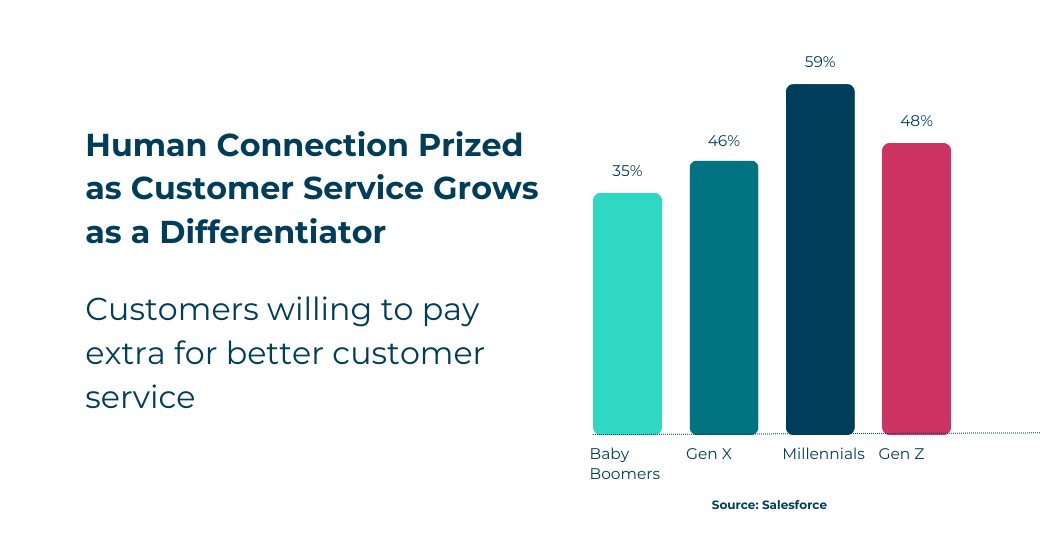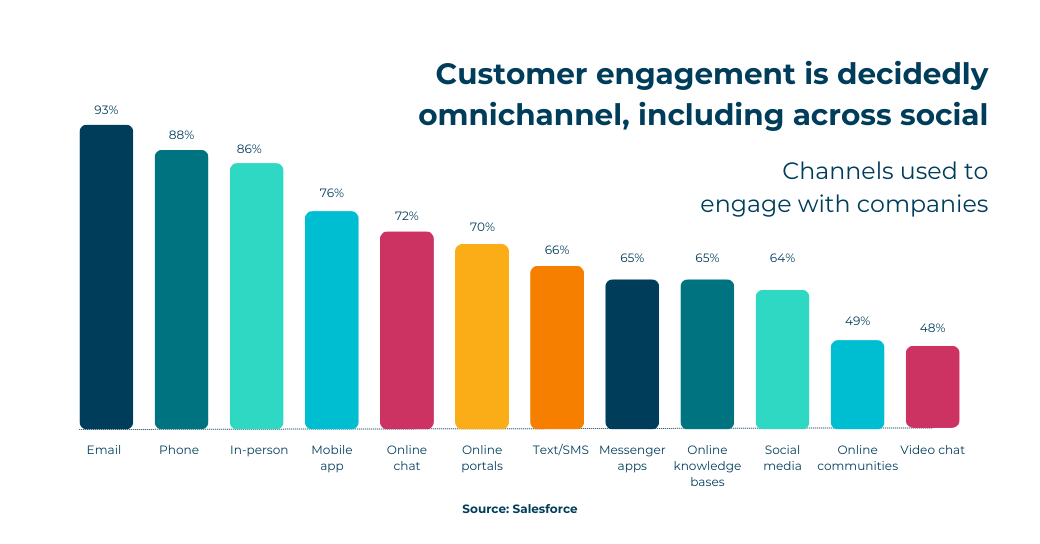
Who wouldn’t appreciate kicking off the year with a dose of facts?
Whether it’s a recap of the events in 2023 or a glimpse into the key trends to anticipate in 2024, at The Nest, we relish starting the year in this manner.
In our quest to assist you in obtaining the authentic data you’ve eagerly anticipated (fingers crossed!), we’ve diligently scoured all around to uncover the latest and reliable reports and studies, culminating in the compilation of the Customer Service Statistics for 2024.
These customer service statistics are extracted from esteemed industry authorities: Klaus, Zendesk, Intercom, Salesforce, Ultimate and many other notable contributors.
To start, let us share with you our all-time favorite stat of the year (We guess some companies have finally understood the incredible benefit of an amazing CX): Customer experience is in the top 5-year priority for 46% of businesses (SuperOffice) (Beating out product (33.6%) and pricing (20.5%).
Because why wouldn’t they place it in their top priority when: 41% of ‘customer-obsessed’ companies achieved a 10% or greater revenue over the last fiscal year (Forrester), or even worse: ‘brand with outstanding customer experience generate 5.7 times more revenue than competitors who fall behind’ (Forbes). One last for the ride: 80% of customers say the experience of a company provides is as important as its product and services.
Customer experience is in the top 5-year priority for 46% of businesses
Oh, and this topic seems to be even more crucial than ever considering that 75% of companies admit customer experience to be essential, or even more crucial than before because of inflationary context (Relation Client x bvaXsights).
Apologies for the slight detour; we understand our focus should be specifically on customer service rather than the broader customer experience. However, the two concepts are intertwined, wouldn’t you agree? (Hopefully, you were already aware of that 😉).
Okay I guess you don’t mind if we stick juuust a little bit longer on that particular topic, and let’s dive into customer’s expectations in 2024.
Consider this not as a nudge, but as a friendly reminder that these insights should be at the forefront of your priorities this year, because haven’t you heard? The customer is always right. Alternatively, to put it in more contemporary terms, a compelling 89% of consumers are inclined to make another purchase when their customer experience expectations have been met, according to Salesforce Research.

Customers today have heightened expectations for their interactions with your brand, redefining the parameters of what constitutes excellent Customer Experience (CX). The evidence is compelling:

This data underscores the crucial importance of delivering top-notch CX. However, delving deeper into customer preferences reveals more nuanced expectations:


Meeting customer expectations is not only rewarding but essential for your bottom line. As customers become more discerning, the effort invested in exceeding their expectations pays dividends. Falling short, however, can have a significant impact.
As such, we can’t stress enough the importance of satisfying your customers. From retaining customers, building brand advocates, acquiring new customers thanks to WOM, to rewarding your bottom line and more!
In our opinion, this could be easily achieved with a strategic partner such as ourselves… Just saying! Need proof? Check out our success stories!
Now, let’s shift our focus to the challenges faced by support teams. We know from experience that many startups and scale-ups find that leading a CX team in the current landscape is no easy feat. This is also one of the reasons why (on top of sooo many others reasons) many businesses across industries and countries entrust us (aka outsourcing partner) with their customer care. As, Ultimate’s 2024 Trends Report reveals:
By the way, we don’t want to brag about it, but by outsourcing your customer service to us, you can experience a significant game-changer for several reasons (we won’t list them all):
In essence, outsourcing to us can enhance your overall customer service capabilities and contribute positively to your business outcomes.
We’ve talked about their greatest challenges, but what about their priorities?
To elevate the role of customer service as a revenue driver, teams must strategically align their goals, especially in the context of tighter budgets compared to previous years. Gartner’s Top Priorities for Customer Service & Support Leaders sheds light on this imperative.
Improving operations emerges as a pivotal strategy for companies aiming to reduce costs, increase productivity, and enhance customer satisfaction. The following customer service statistics outline the key priorities across different teams:

Notably, optimizing costs remains a top priority for nearly half of the respondents. As businesses strive for growth, the challenge is to expand while effectively managing expenses
PS: want to know how outsourcing can help startups and scale-ups expand while effectively managing expenses?
Outsourcing serves as a strategic move for startups and scale-ups looking to expand while maintaining a tight grip on expenses. By entrusting operational functions, such as customer service, these businesses can benefit from specialized skills, increased efficiency, and cost-effective solutions. Outsourcing allows startups and scale-ups to allocate resources more efficiently, focusing on core competencies while leveraging the expertise of dedicated professionals. This not only streamlines operations but also provides the flexibility needed to scale without the burden of excessive overhead costs. In essence, outsourcing becomes a valuable ally in the journey of startups and scale-ups, offering a pathway to growth without compromising financial prudence.
Interested in benefiting from these advantages? Reach out!
What about automation you may ask? This topic has been such a trend in 2023, which is why we’ll address it for sure!
Many businesses across industries and countries, have started to trust in the capabilities of AI to automate certain aspects of customer service to provide more personalized support across their channels, to simplify their processes, to improve their efficiency, to reduce their errors…
So what about it?
However, we are not at all saying that AI will completely revolutionize or replace customer service. While AI can automate various tasks, it can’t quite match the human touch. Things like empathy, understanding context, making complex decisions, and just being trustworthy, that’s where people shine. Striking the right balance between automation and top-notch customer service, that’s the real challenge when it comes to AI. It’s a juggling act you can’t afford to drop.
From a branding aspect, to copyright and legal aspects, or even customer data protection, the risks of implementing AI are various, and we definitely don’t want to scare you. However, we would recommend you partnering with a service provider that really understands how things work, and can help you customize AI offerings to your unique needs.
In the realm of customer service, where customers are cautious with their spending and expectations are higher than ever, service teams possess the potential to thrive. This success hinges on several key factors:
Companies need to grasp the potential of exceptional customer service as a revenue driver. By sharing support data across teams and incorporating customer voices into decision-making, businesses can shape future plans with a genuine customer-centric approach. This collaborative approach not only strengthens customer relationships but also contributes to long-term success.
With customer expectations evolving to demand instant responses, multilingual support, and seamless omnichannel experiences, having the right number of agents is paramount. Outsourcing emerges as a strategic solution, allowing companies to efficiently adapt to these growing demands. Outsourced teams, equipped with specialized skills and language proficiencies, can promptly address customer queries across various channels, ensuring a localized and responsive approach. This strategic deployment of outsourced agents not only meets the evolving expectations of customers but also provides a scalable solution for businesses navigating the challenges posed by increasing demands for instant and multichannel support.
An updated tech stack is essential for customer service excellence. Embracing technologies like AI and automation empowers customer service agents to focus on intricate queries while efficiently handling repetitive tasks. This not only enhances efficiency but also elevates the overall customer experience. Yet, professional support is required to set up AI in support the right way while managing its risks, perfecting the balance between both for an optimal result.
In the context of these principles, outsourcing emerges as a strategic solution for startups and scale-ups aiming to expand while maintaining financial prudence. Outsourcing allows businesses to tap into specialized skills, streamline operations, and leverage cost-effective solutions, providing a pathway to growth in the face of evolving customer expectations and financial constraints.